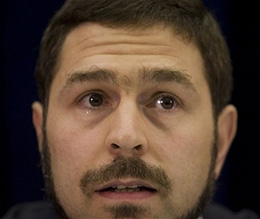 |
 |
 |
 News from Around the Americas | September 2006 News from Around the Americas | September 2006  
Canada May Protest US Treatment of Tortured Man
 Reuters Reuters


| | With tears in his eyes, Maher Arar reacts during a news conference on Monday Sept. 18, 2006 in Ottawa, Canada. An inquiry into the U.S. transfer of Canadian citizen Arar to prison in Syria found Canadian authorities gave misleading information to the Americans that likely led to the deportation, a report released Monday said. Arar was traveling on a Canadian passport when he was detained at a New York airport in September 2002 during a stopover on his way home to Canada from vacation in Tunisia. (AP/CP, Fred Chartrand) |
Ottawa - A formal Canadian protest to Washington appeared to be planned on this week as the result of an official inquiry into the U.S. deportation in 2002 of a Canadian citizen to Syria, where he was subsequently tortured.

The government said it agreed with the 23 recommendations by Justice Dennis O'Connor, who headed the inquiry and concluded that Maher Arar was tortured in Syria, the country of his birth, after being arrested in New York on suspicion of involvement with al Qaeda.

"Mr. Arar has been done a tremendous injustice," Prime Minister Stephen Harper told the House of Commons. "The government has received this report that has a series of recommendations... The government will act swiftly based on those recommendations."

Most of the recommendations focus on errors made by the Royal Canadian Mounted Police, which wrongly told U.S. authorities that Arar was an Islamic extremist.

But one recommendation was to "register a formal objection with the governments of the United States and Syria concerning their treatment of Mr. Arar and Canadian officials involved with his case."

The report also advocated compensating Arar.

"We think those are good and sound recommendations," Public Security Minister Stockwell Day said of the entire package.

"We don't see a problem with any of those recommendations. We think it's good advice from Justice O'Connor, and we intend to act on those," he told reporters.

O'Connor concluded that the American authorities who handled Arar's case had treated him in "a most regrettable fashion."

"They removed him to Syria against his wishes and in the face of his statements that he would be tortured if sent there," he said.

He also said U.S. officials were not candid with the Mounties or with Canadian diplomats about their intentions or about the process that led to Arar's removal after his arrest at John F. Kennedy Airport in New York.

Arar, 36, says he was repeatedly tortured in the year he spent in Damascus jails. He was freed in 2003.

U.S. Attorney General Alberto Gonzales, asked to comment about the report, said: "Mr. Arar was deported under our immigration laws. He was initially detained because his name appeared on terrorist lists; he was deported according to our laws."

He said the United States always seeks to assure itself that anybody it sends out will not be tortured. | 
 | |
 |



